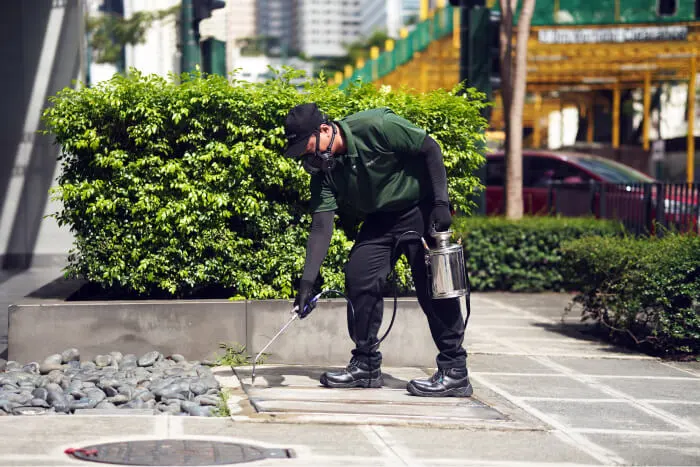The tropical climate of Singapore presents two distinct seasons — the wet season, characterized by frequent rainfall and high humidity, and the dry season, marked by high temperatures and low humidity.
Given how the climate swings between high humidity and intense heat, it begs us to wonder: do pests behave differently across these seasons, and consequently, is pest control seasonal in Singapore?
In this article, we’ll explore how seasonal changes influence pest behavior and 9 expert tips for effective pest management in the Lion City.
How Does the Season Affect Pests in Singapore?
Have you noticed that certain pests are more common during certain months?
Pest activity can indeed change with the seasons. Much like us, pests have evolved to thrive under specific conditions, and their activities are often influenced by the environment. Consequently, pest problems may increase as the weather becomes more unpredictable or extreme due to climate change.
During the wet season, which typically occurs from November to January, pests such as mosquitoes, rodents, and cockroaches are more active as they seek shelter from the rain and find breeding grounds in stagnant water.
Conversely, during the dry season, which occurs around May to September, pests like ants and flies are more evident as they search for water sources.
Here’s a list of pests to look out for throughout the seasons:
- Wet Season: mosquitoes, rodents, cockroaches, and termites
- Dry Season: flies, ants, rodents, and cockroaches
Having both extremely warm and humid conditions, pests thrive all year round in Singapore. However, while these pests typically become active during different seasons, you may have noticed their presence more throughout the year as climate change exacerbate how the seasons affect pests in Singapore.
In 2023, Singapore was hit with one of the hottest summers in history followed by heavy rains come October, which encourage both agricultural and urban pests to be more active. In the urban setting, you may notice more flies as they breed more and mosquito bites as they become more active at seeking sustenance.
Similarly, heavy rainfall may encourage cockroaches and rodents to seek shelter indoors where they can spread diseases, contaminate food, and cause other damages. You can’t let your guard down when it comes to pests, and this is one of the many reasons to hire a pest control company.
9 Tips for Seasonal Pest Control in Singapore

As the environment changes between wet and dry seasons, It’s important to adjust your tactics to keep your surroundings pest-free. Here are 9 expert-approved tips for seasonal pest control:
1. Be Aware of Seasonal Pests
The most important step is learning how pests respond to the seasons. Use your knowledge of wet vs. dry season pest behaviours to make your surroundings inhospitable for pests as much as possible.
For example, with the knowledge that flies lay eggs during the summer, you would avoid leaving food or leftovers in the open, keep doors and windows shut as much as possible, and schedule fly pest control services during this period.
2. Watch Out for Signs of Pest Infestation
Most of the time, pest infestations happen under our noses. Many only find out their property is infested when it’s already too late.
You may not immediately see pests around your property, but there are signs you should look out for, such as droppings, discarded wings, egg cases, and so on. You may also hear scratching noises, which could indicate drywood termites; find damage in food containers caused by rodents or cockroaches; or see an ant or two before seeing an army marching to your pantry.
Don’t wait to call on a rodent, cockroach, termite, or ant control in Singapore until you see an actual pest. Be alert to the signs of different pest infestations.
3. Keep Up on Cleaning and Maintenance
Pests often enter buildings and homes through a variety of entry points. Apart from windows and doors, various pests may enter the premises through gaps between walls and open drains. They’re also attracted by dirty environments and exposed leftovers.
You can discourage them from entering your premises by keeping your surroundings clean and repairing any damage that could serve as an entry point for pests. Another thing to consider is keeping food sealed to avoid attracting flies, ants, and cockroaches. Once these pests are inside your home, especially cockroaches, it may be difficult to get rid of them without cockroach pest control in Singapore.
4. Repair Leaks
Leaks leave parts of your home damp and, therefore, become an ideal breeding ground for various pests. If a part of your house becomes a base for mosquitoes, even the best mosquito pest control won’t be able to get rid of them.
So, a seasonal pest control tip is to always check your home for roof damage or leaky pipes and repair them before the rainy season.
5. Manage Humidity Levels at Home
As we have established, the humidity levels in your premises attract pests. Be sure to keep humidity levels in your home low during wet seasons by opening some windows or doors, or turning on exhaust fans to get the air circulating.
6. Clear Stagnant Pools of Water
During the wet season, pools of water may form in random places around you. Uncovered, containers left lying around may accumulate water during the rain. Stagnant water, such as stored water or water in vases, may also become prime locations for breeding mosquitoes.
Stagnant water is the main breeding ground for mosquitoes. So, don’t make Singapore any more ideal to mosquitoes, and make it a habit to do the following to prevent water from pooling:
- Cover containers or turn them upside down
- Empty planters and plant plates
- Change the water in vases regularly
- Keep drains and gutters clear
7. Keep Wood Products Dry
Termites are attracted to damp wood. With this knowledge, it is best to keep surrounding areas, wooden structures and furniture, and other cellulose-based items dry, both inside and outside.
It’s important to repair leaks immediately and clear out pools of water. This also means removing mulch and rotting wood in your property because these can attract termite alates that form new colonies.
Doing these tips for seasonal pest control in Singapore will significantly help keep your property termite-free on top of effective termite pest control.
8. Maintain Pet Hygiene
Fleas and ticks are unhealthy for your pets, but they can also spread and cause allergic reactions.
When it comes to fleas, it’s best to take precautionary measures because once they infect your beloved pets, it can take a while to eliminate them.
Keep your pets clean to keep them tick and flea-free. Be sure to wash them regularly especially if they go out, visit parks, or have playdates with other dogs. Consider investing in flea pest control to make sure that other animals don’t spread the pest to your home.
9. Hire Professional Pest Control Services
There are plenty of DIY pest control methods nowadays. These are marketed as affordable and effective. But is it really saving you from expenses long-term?
DIY pest control methods may remove pests temporarily at best. Without rodent control services to help address the root problem, rats may keep coming back to your home no matter how many traps you set.
A comprehensive, professional pest control in Singapore is still the best option if you really want to get rid of pests in the long run. Professionals who understand pest behaviour will implement the right strategy in dealing with pest infestation as well as give recommendations for keeping pests away for good.
Keeping Your Home Pest-Free All Year Round with PestBusters

Singapore’s unique tropical climate significantly affects pest activities, which is why it is crucial to adapt your seasonal pest control strategies accordingly.
While the tips we provided above offer seasonal solutions, engaging with professional pest control services in Singapore like PestBusters is a more reliable way to prevent or mitigate infestations year-round.
If you want to know more about our pest control services, don’t hesitate to contact us.

